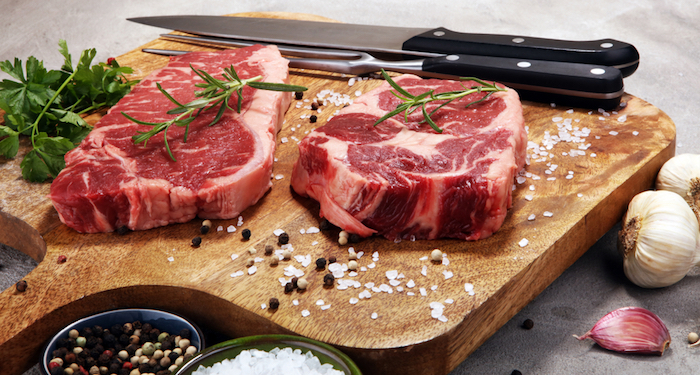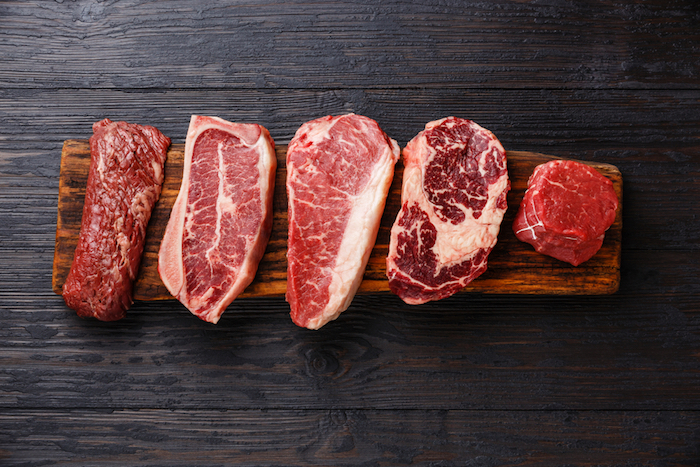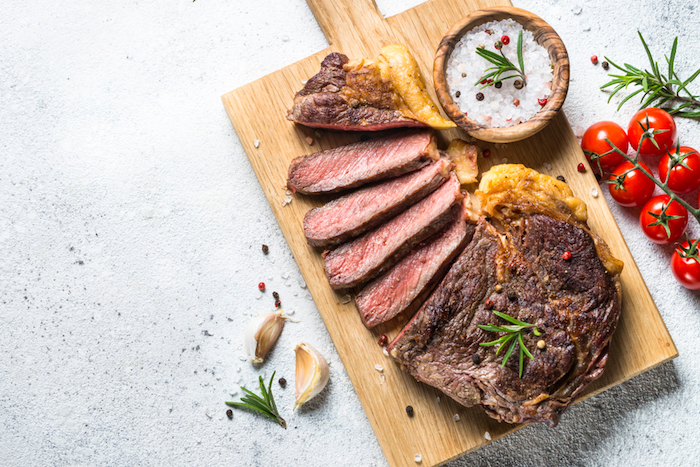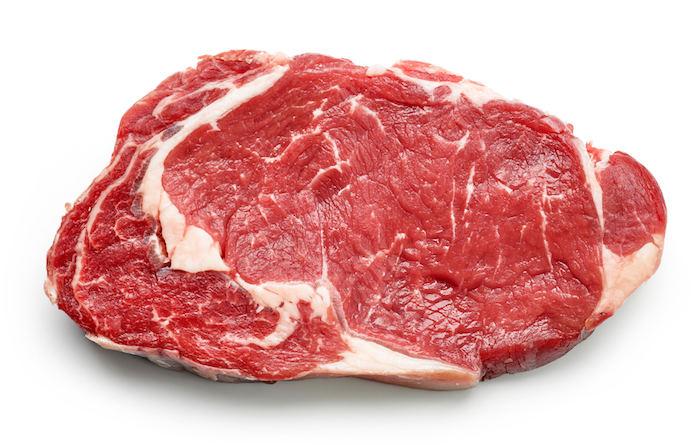A lot of people see the demonization of red meat as a relic of 1980s food science, a time when it was believed that fat made you fat and jogging was the greatest form of exercise on Earth.
But even recent, high quality studies are linking red meat with increased risks of heart disease and cancer. Is it fair to make the absolute statement that red meat causes cancer? If there is a risk, is it really that significant? And how important is the delineation between red meat and processed red meat? We’ve spoken to a registered dietitian and looked at a ton of studies to figure out the answers — well, at least answers that are as satisfying as we could get — to the following issues.
- What Do We Mean By “Red Meat Consumption”?
- Red Meat vs Processed Meat
- Does Red Meat Cause Cancer?
- Does Red Meat Cause Heart Disease?
Editor’s note: The content on BarBend is meant to be informative in nature, but it shouldn’t take the place of advice and/or supervision from a medical professional. The opinions and articles on this site are not intended for use as diagnosis, prevention, and/or treatment of health problems. Speak with your physician if you have any concerns or before beginning any new dietary regimen.

What Do We Mean By Red Meat Consumption?
If we say “red meat causes” something, are we talking about daily steaks? Will a single bite of brisket increase your risk of disease? Many studies just say something like “regular consumption” — what are we really talking about, here?
“We’re not just talking about people eating keto or carnivore,” says New York-based registered dietitian Dina D’Alessandro, MS, RD. “I’d say low consumption would be one to two times a week, but what’s the dosage? Is it 6 ounces, a 12-ounce burger? Who knows?”
Then you need to remember that there are a lot of different kinds of foods that fall under the umbrella of “red meat.” Organic, grass-fed rib eye has a very different nutrient profile to the stick of jerky you grabbed at checkout. In addition, although it’s white when cooked, the USDA considers pork to be red meat because of its high myoglobin content. (In other words, it’s red when it’s raw.)
[Learn more: What’s the Difference Between Grass Fed and Grain Fed Beef?]

Red Meat Vs Processed Meat
Indeed, processed red meat is what gets the strongest links to health problems. It’s typically higher in sodium, contains nitrates and preservatives, it’s sometimes smoked, all of these alter the composition of the product in question.
“It’s more along the lines of processing, the manipulating of certain whole foods to become other things, and also the nitrate factor as well as additives,” says D’Alessandro. “Deli meats and salamis is what gets a bigger focus, we’re not talking so much about the juicy piece of steak.”
The thing with processed meat is that it’s typically associated with unhealthy lifestyle factors. For instance, some research has found that people who consume a lot of processed meat are more likely to smoke and to consume low amounts of fruits and vegetables.(1)(2)

Some research has found that people who consume a lot of processed meat are more likely to smoke and to consume low amounts of fruits and vegetables.
Studies usually try to correct for these sorts of factors, but processed meat is nonetheless more consistently linked with increases in cancer risk than regular red meat, particularly colorectal cancer — but it’s likely a very small increase.(3) For instance, a 2011 meta-analysis published in PLoS One found a 1.18 percent increase in risk for every 50 grams of processed meat consumed per day.(4)
Smoking, by comparison, increases the risk of heart disease by 200 to 400 percent and lung cancer by 2,500 to 5000 percent.(5) Even moderate alcohol consumption is linked to a 20 to 50 percent higher chance of getting various cancers like throat, breast, and colorectal. People are a lot quicker to talk about the health issues with jerky than they are to swear off alcohol, even though that would be a much more effective way to drop your cancer risk.
But let’s stick to red meat in general.

Does Red Meat Cause Cancer?
We need to firmly state that you should speak with a physician if you’re concerned about your cancer risk — it’s associated with a huge variety of lifestyle factors outside of simply how often you eat red meat. And that’s perhaps the biggest problem with questions like these: what else are you doing in your life to increase or decrease your risk of cancer?
The meta-analysis cited above found processed meat to increase the risk of colorectal cancer by 1.18 percent for every 50 grams consumed per day; it found the same for every 100 grams of regular red meat. If that’s troubling, it’s worth highlighting that some research suggests regular exercise can lower the risk of cancer by up to 20 percent and a high intake of fruits and vegetables by up to 10 percent.(6) These numbers change depending on the study, but these numbers emphasize that the effect red meat might have could wind up somewhat negligible in the grand scheme of things.
We can’t pretend no evidence links red meat and cancer, because plenty of studies suggest as much.(7)(8)(9) But they’re typically observational and they often neglect to differentiate between red meat and processed meat. Plenty of meta-analyses have found no discernible link with red meat and cancer at all.(10)(11)
Still, most experts fall into the camp of it slightly upping your cancer risk.
One helpful side note: eating fruits or vegetables with your meat appears to slightly reduce said risk.(12)(13)(14) This seems to be because the green chlorophyll competes for absorption with a pigment in meat that might be cancerous, and because compounds in cruciferous vegetables can reduce the impact of problematic chemicals like heterocyclic amines. Eat a plant-rich diet.

Does Red Meat Cause Heart Disease?
Plenty of studies, like a meta-analysis of 20 studies looking at over a million people, found no association at all between red meat and heart disease.(15) (It did find a slight increase for processed meat, though.)
But we can’t firmly say that red meat definitely will or won’t have an effect here. This is in part because the consequences of saturated fat on cardiovascular health are still murky. The notion that diets in high in saturated fat lead to atherosclerosis (a build up of plaque in the arteries) makes sense in theory, but the real world data is surprisingly inconsistent. Meta-analyses of hundreds of thousands of people frequently find no connection between saturated fat intake and cardiovascular disease.(16)(17)(18)
Meta-analyses of hundreds of thousands of people frequently find no connection between saturated fat intake and cardiovascular disease.
The idea is that saturated fat raises levels of LDL, or “bad” cholesterol in the blood. The conclusion is iffy because there are subtypes of LDL: small, dense LDL and large LDL. The smaller type has the big risk of heart disease, but some studies have found saturated fat to change the particles from small to large… maybe reducing the risk of heart disease? (19)(20)(21)(22)
“I wish I could say ‘Yes, absolutely,’ but there’s no way that would be the thing to say,” says D’Alessandro. “Because you have a lot of related tangents. Cholesterol, fiber, lifestyle, and all these things play a role. I hate to say it, but even as the ‘expert’ it depends. The only time you’re going to find somebody geared more toward a definitive ‘pro’ or ‘con’ position is when they have an agenda to push.”

Tips to Reduce Health Issues With Red Meat
- Eat more unprocessed, grass-fed meat. It’s higher in antioxidants and beneficial fats, like Omega-3 and CLA, that may actually lower the risk of heart problems.
- Marinate before you cook. Some research has found common ingredients in marinades, like vinegar, garlic, rosemary, and onion powder, can reduce the formation of the maybe-carcinogenic heterocyclic amines (HCAs) by over 70 percent.(23)
- Eat veggies with your meat. Again, they’re great for reducing the impact of HCAs.(12)(13)(14)
- Avoid charring your meat. Tasty, but definitely increases HCAs.
- Eat well, exercise, and keep body fat levels low. Not really kitchen pointers, but these tips will go a lot further toward lowering your risk of cancer and heart disease than any marinade will.
The Takeaway
This is an enormously complicated topic, but perhaps the most important takeaway is that the dose makes the poison. Red meat is associated with a slight increase in the risk of cancer, with most of the evidence suggesting it’s colorectal cancer. The American Heart Association still states that red meat increases the risk of heart disease. Firm associations in either case are frustratingly difficult to make.
But there’s a difference between having bologna and bacon at every meal and enjoying a grass-fed burger a couple of times a week.
“These studies are just retrospective associations of things and they always will be,” says D’Alessandro. “Ultimately the issue is diving more into how healthy a human are you going into this? How many times a week are you eating added sugars, processed foods, how often are you exercising? Even spinach in high amounts can be toxic to people. I feel like we might be getting over out heads telling people to lay off of fatty foods. It’s not the one meal that makes or breaks the person.”
Red meat a couple of times a week is not a surefire way to get cancer. Eat your veggies, don’t smoke, stay active, and above all, make an appointment with your physician if you’re concerned with your risk of cancer or heart disease.
Featured image via beats1/Shutterstock
References
1. Bedford JL, et al. Diets and selected lifestyle practices of self-defined adult vegetarians from a population-based sample suggest they are more ‘health conscious’ Int J Behav Nutr Phys Act. 2005 Apr 13;2(1):4.
2. Rohrmann S, et al. Meat consumption and mortality–results from the European Prospective Investigation into Cancer and Nutrition. BMC Med. 2013 Mar 7;11:63.
3. Cross AJ, et al. A prospective study of red and processed meat intake in relation to cancer risk. PLoS Med. 2007 Dec;4(12):e325.
4. Chan DS, et al. Red and processed meat and colorectal cancer incidence: meta-analysis of prospective studies. PLoS One. 2011;6(6):e20456.
5. Key TJ. Fruit and vegetables and cancer risk. Br J Cancer. 2011 Jan 4;104(1):6-11.
6. Farvid MS, et al. Fruit and vegetable consumption and breast cancer incidence: Repeated measures over 30 years of follow-up. Int J Cancer. 2019 Apr 1;144(7):1496-1510.
7. Norat T, et al. Meat, fish, and colorectal cancer risk: the European Prospective Investigation into cancer and nutrition. J Natl Cancer Inst. 2005 Jun 15;97(12):906-16.
8. Giovannucci E, et al. Intake of fat, meat, and fiber in relation to risk of colon cancer in men. Cancer Res. 1994 May 1;54(9):2390-7.
9. Cho E, et al. Red meat intake and risk of breast cancer among premenopausal women. Arch Intern Med. 2006 Nov 13;166(20):2253-9.
10. Alexander DD, et al. Meta-analysis of prospective studies of red meat consumption and colorectal cancer. Eur J Cancer Prev. 2011 Jul;20(4):293-307.
11. Alexander DD, et al. Red meat and colorectal cancer: a critical summary of prospective epidemiologic studies. Obes Rev. 2011 May;12(5):e472-93.
12. Kapiszewska M, et al. A vegetable to meat consumption ratio as a relevant factor determining cancer preventive diet. The Mediterranean versus other European countries. Forum Nutr. 2006;59:130-53.
13. Murray S, et al. Effect of cruciferous vegetable consumption on heterocyclic aromatic amine metabolism in man. Carcinogenesis. 2001 Sep;22(9):1413-20.
14. de Vogel J, et al. Green vegetables, red meat and colon cancer: chlorophyll prevents the cytotoxic and hyperproliferative effects of haem in rat colon. Carcinogenesis. 2005 Feb;26(2):387-93.
15. Micha R, et al. Red and processed meat consumption and risk of incident coronary heart disease, stroke, and diabetes mellitus: a systematic review and meta-analysis. Circulation. 2010 Jun 1;121(21):2271-83.
16. Siri-Tarino PW, et al. Meta-analysis of prospective cohort studies evaluating the association of saturated fat with cardiovascular disease. Am J Clin Nutr. 2010 Mar;91(3):535-46.
17. Chowdhury R, et al. Association of dietary, circulating, and supplement fatty acids with coronary risk: a systematic review and meta-analysis. Ann Intern Med. 2014 Mar 18;160(6):398-406.
18. Hooper L, et al. Reduced or modified dietary fat for preventing cardiovascular disease. Sao Paulo Med J. 2016 Apr;134(2):182-3.
19. Austin MA, et al. Low-density lipoprotein subclass patterns and risk of myocardial infarction. JAMA. 1988 Oct 7;260(13):1917-21.
20. Dreon DM, et al. Change in dietary saturated fat intake is correlated with change in mass of large low-density-lipoprotein particles in men. Am J Clin Nutr. 1998 May;67(5):828-36.
21. Siri-Tarino PW, et al. Saturated fat, carbohydrate, and cardiovascular disease. Am J Clin Nutr. 2010 Mar;91(3):502-9.
22. Dreon DM, et al. Low-density lipoprotein subclass patterns and lipoprotein response to a reduced-fat diet in men. FASEB J. 1994 Jan;8(1):121-6.
23. Gibis M. Effect of oil marinades with garlic, onion, and lemon juice on the formation of heterocyclic aromatic amines in fried beef patties. J Agric Food Chem. 2007 Dec 12;55(25):10240-7.